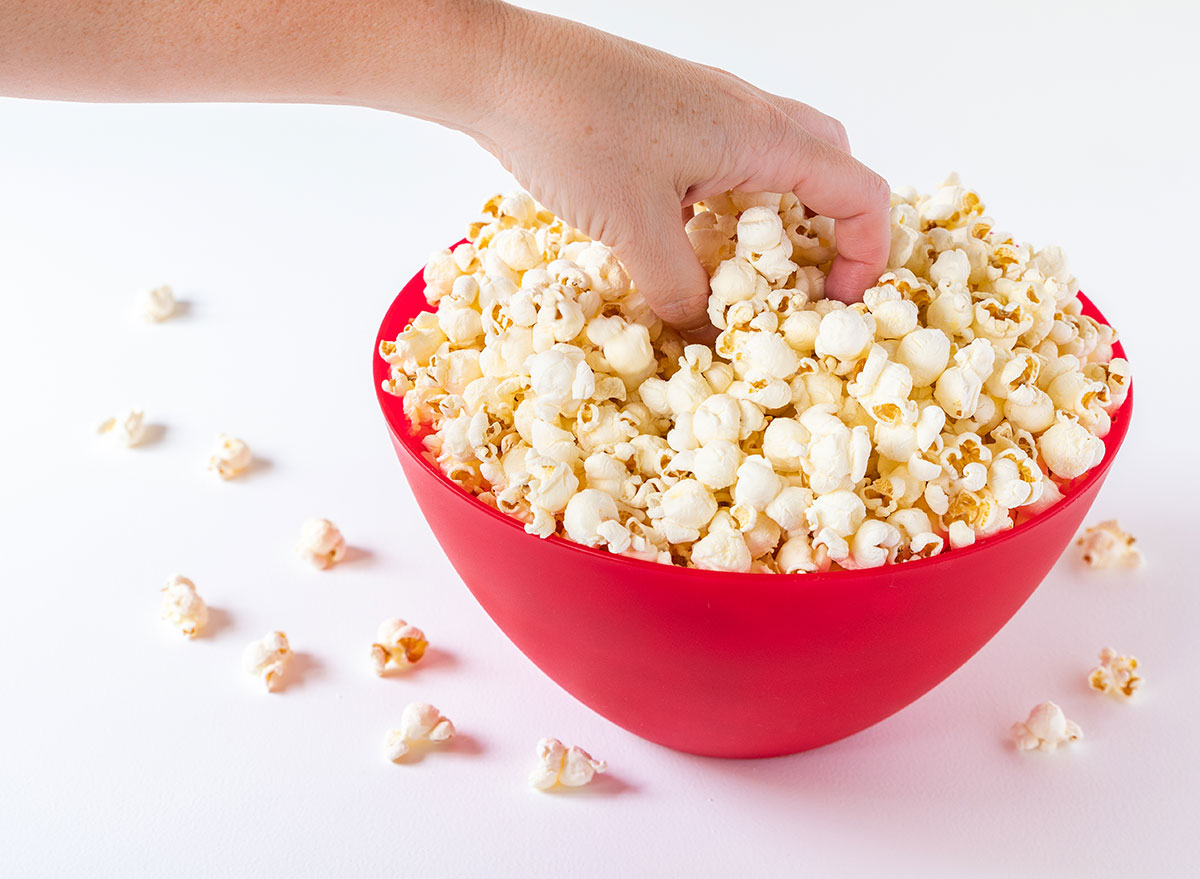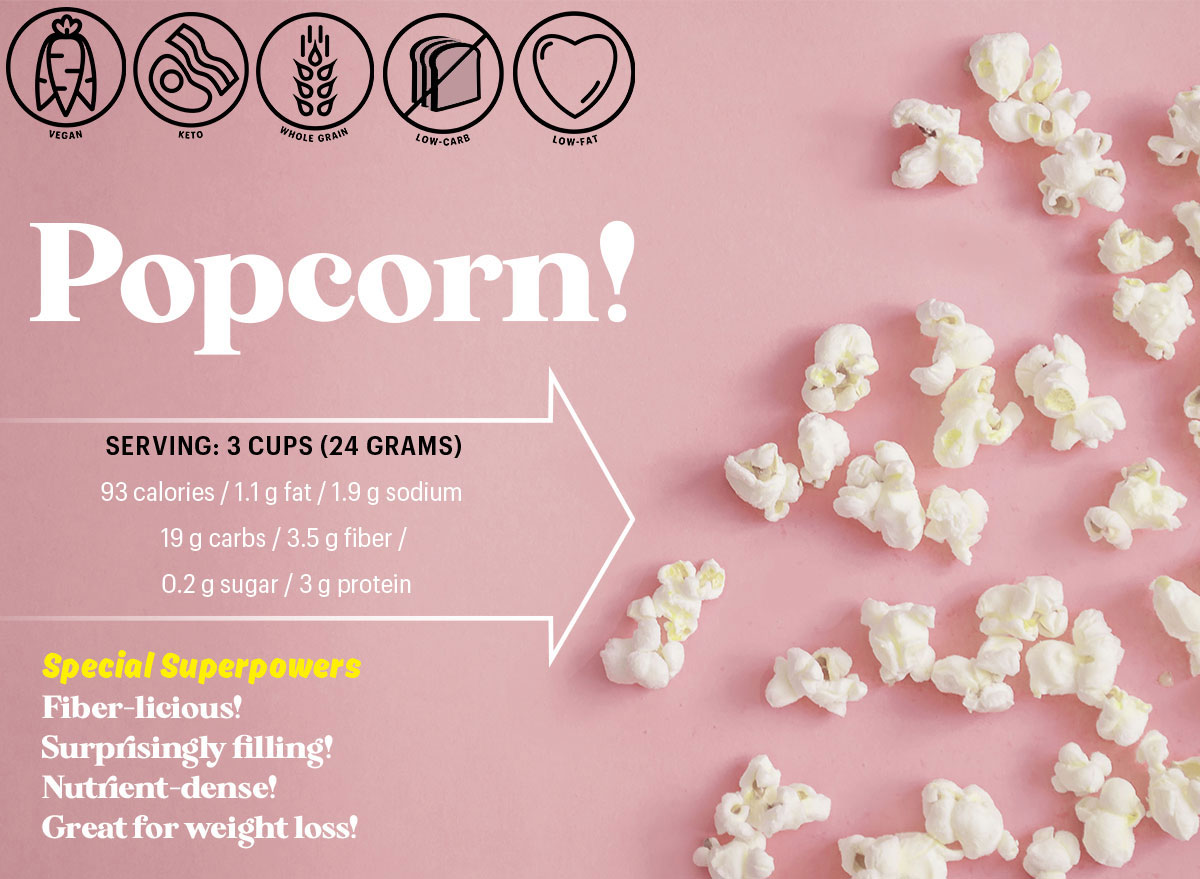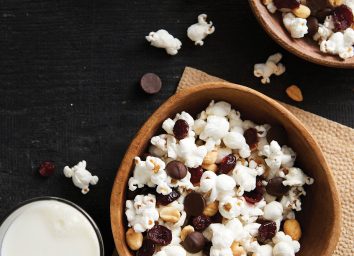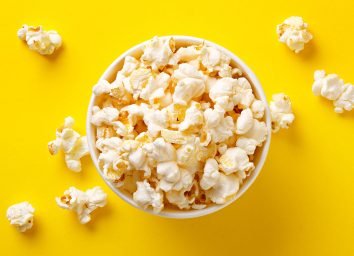The Nutrition Low-Down on Popcorn

Popcorn has a reputation for being an indulgent midnight snack for movie-addicts and partiers. But (surprise!) so long as you don't douse it in butter and caramel sauce, popcorn is actually a fiber-rich, antioxidant-packed, low-calorie snack. Let's investigate popcorn's nutrition profile.
Wait, so is popcorn healthy?
You probably already know this, but popcorn comes from corn. Heat up the kernels of corn, and thanks to their water content, the golden nuggets explode into the puffy, scrumptious snack.
Corn is considered a whole grain—and that's true even after it's been popped. And guess what? Whole grains are pretty healthy! Unlike refined grain snacks (like white bread and crackers) that have had the entire grain seed removed, whole grain snacks still contain seeds, which is where lots of vitamins and minerals (like iron, magnesium, phosphorus, and potassium) are stored. This makes whole grain snacks like popcorn (!) seriously nutrient-dense.
In fact, whole grain consumption has been linked to a slew of health benefits, including reduced inflammation, decreased risk of heart disease and stroke, improved digestion, reduced cholesterol, and more. Fun!
So, is popcorn healthy? Ultimately, that comes down to how you prepare it. As a general rule, air-popped popcorn—which is made using just air and heat—is healthy. But, popcorn prepared with oils, fat-filled ingredients, and/or sugar is less healthy (duh!).
For instance, most microwavable popcorn is made with partially hydrogenated oils, which are full of trans (read: bad-for-you) fat. (For healthier picks, check out our list of best and worst microwaveable popcorn brands.)
And, most movie theatre popcorn is loaded with salt, butter, and sugar, which turn the usually low-calorie, low-fat snack into a fatty calorie bomb.
If you're a flavor-feen, the healthiest option is to add cinnamon, a pinch of salt, some parmesan cheese, a teaspoon of coconut oil, or some dried spices to an air-popped serving.
What's the nutrition breakdown of popcorn, exactly?

The nutritional stats on popcorn tell you all you need to know. Here's the nutritional content of one 3-cup serving of air popped (no added sugar, grease, or salt) popcorn, according to the USDA:
- Calories: 93
- Fat: 1.1 g
- Sodium: 1.9 mg
- Carbohydrates: 19 g
- Fiber: 3.5 g
- Sugar: 0.2 g
- Protein: 3 g
Basically, there's not much to popcorn except for a little bit of protein, a tiny bit of fat, and a moderate amount of carbs.
The health benefits of popcorn
The main perk of popcorn is just how filling it can be. While most very low fat foods aren't super satiating, popcorn surprisingly is. That's because it contains 3.5-whopping-grams of insoluble fiber (about 14 percent of recommended daily fiber intake for women and about 12 percent for men), which helps you feel full, longer. For comparison's sake, that's similar to the amount of fiber you'd get from eating a large banana or red apple.
For people trying to lose weight, consider this: One 2012 study published in the Nutrition Journal found that 15 calories of popcorn was just as satisfying as 150 calories of potato chips. Pretty wild, right?
Beyond just being high in vitamins and minerals, a 2019 study published in the journal Antioxidants showed that popcorn contains super high amounts of an antioxidant called polyphenol—even more than most fruits and veggies. Antioxidants' main claim to fame is that they help neutralize something in the body called "free radicals," which, in excess, speed up aging and increase the risk of disease. Can popcorn replace your anti-aging creams? Probably not. But it also can't hurt.
I'm on a diet . . . can I eat popcorn?
It depends. Popcorn, which comes from a grain, isn't allowed on grain-free diets like paleo or Whole30.
But, with only 19 grams of carbohydrates—and only 15 grams of net carbohydrates—popcorn is allowed on the keto diet, and easily fits into most other low-carb diets, too. The two exceptions to this are the South Beach and Atkins diets, both of which forbid the snack during the first phase.
Popcorn is also not an animal product (lol, duh), so vegans and vegetarians can snack freely.
As for whether or not those with celiac disease or gluten-intolerance can eat popcorn? It's complicated. Popcorn technically contains zero gluten. But, it does contain a protein called maize prolamins, which has been shown to cause an inflammatory response in people with severe gluten intolerance. Sigh.
Those who are allergic to wheat, soy, and rice may also be at risk of having an allergic reaction to popcorn. The only way to know for sure if you have a corn/popcorn sensitivity is to ask your healthcare provider to perform an allergy test.
The takeaway on popcorn
Popcorn may look and crunch like an unhealthy snack, but it's actually pretty darn healthy so long as you opt for the air-popped, plain kind.
Is chowing down on an entire bag of movie theatre popcorn every now and then the worst thing in the world? No. But it's not the kind of snack you want to be indulging in every time you plant yourself on the couch.








